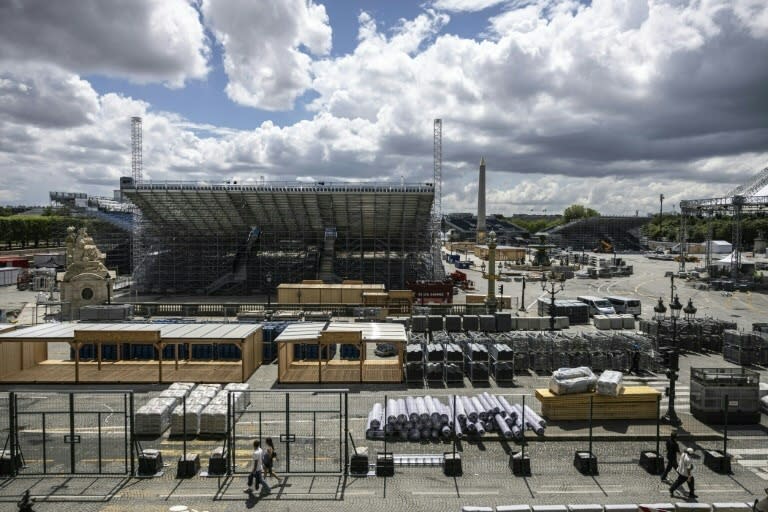Paris prepares to refashion Olympics with urban look

Paris is putting on its game face to welcome the world for an Olympics it hopes will transform the look and feel of the event and burnish its image in the eyes of the world.
"We are going to the heart of the city and leaving the stadiums," Pierre Rabadan, Deputy Mayor of Paris in charge of Sport and the Olympic and Paralympic Games told AFP.
It is a change of model for the Olympics, whose centre of gravity has long been a suburban main stadium.
"Once we are in the city centre, it's going to be special because that's a field of play and no other cities have done that," the International Olympic Committee's Executive Director of the Olympic Games, Christophe Dubi, told AFP.
"The Games adapt to the city and the region and not the reverse."
The Olympics have long been a made-for-TV spectacular with a global audience of billions, but in Paris the Games are going on location.
"When you watch this on TV, you will know it's in Paris. There will be no doubt these are the Games of Paris, whether it is the colours you use or the architecture that you see, instantly you'll know you're in Paris," Lambis Konstantinidis, the Executive Director of Coordination and Planning for the organising committee (COJO), told AFP.
The opening ceremony will cruise down the Seine and the long-distance swimmers and triathletes will also battle along the river from the gilded Alexandre III bridge in front of the Invalides and Place de La Concorde, both competition venues, past the Grand Palais, another venue near to the Eiffel Tower and the fan park at Trocadero, two more competition sites.
The number of building projects required for any Olympics presents logistical challenges but creating a series of temporary venues in the heart of a city, whose residents are famed for complaining at an Olympic level, has presented particular challenges.
"Concorde, Champs de Mars, Invalides, Pont Alexandre III, Trocadero -- four Stades de France in the number of seats," said Rabadan, whose staff estimated he has attended "more than 30" public meetings to placate Parisians.
As opening day rushes closer, the banners, dominated by the Paris Olympic theme colour of purple, are being hung from lamp posts; reddish-pink plastic squares are being laid in bike lanes; shopping areas and streets with schools are being dressed up; and the 2,000 planned billboards are appearing on the main avenues. The Eiffel Tower is decked out in the five rings.
More than 20 metro stations will be closed for the opening ceremony and three, in the heart of city, for the whole Games, but not until the eve of the opening ceremony. A few roads around the venues are already blocked off, more will close for the Games, on others VIP lanes, reserved for the Olympic family and their guests, will restrict traffic, but not just yet.
Workers are still busy on the temporary sites, but that insist Rabadan and Konstantinidis, was always the plan.
"(They) will be deployed from the beginning of July," said Rabadan explaining they could have been finished earlier but organisers wanted to avoid "impacting people's daily lives".
- 'More generous' -
Rabadan estimates the number of visitors to what is already one of the world's most popular tourist destinations will be up 20 percent during the Olympics and Paralympics. In a city used to seeing armed soldiers and police patrolling, security will also be more visible, with 45,000 personnel on duty for the opening ceremony.
At the heart of the city, the 19-acre Place de La Concorde will be home to an 'urban park' hosting skateboarding, climbing and BMX biking, with DJs and a completely vegetarian food offering.
Dubi said the strategy was to "make the Olympics more open, more urban, younger, more balanced, more generous".
"For a youth audience, the Olympic Games have to apply... and appeal "to a different range of demographics," said Konstantinidis.
"It's not just the super young or the super old."
International sports mega-events have come in for criticism for their environmental impact.
All those involved insist concentrating so much action in the city centre is helping make the 2024 Games "sustainable".
The Olympics, said Konstantinidis, have to be "sustainable both from an environmental point of view, but also from an event that does not fuel what we call the benchmark inflation".
These Games, he said, were battling the trend of "more and more and more and bigger and bigger and bigger".
Among the innovations will be a ban on disposable bottles. Coca Cola, one of the "Olympic Partners", is installing 700 specially-developed automated soda fountains.
- 'Local colour' -
The city is planning to use this as a precedent and make a bottle ban permanent. Rather than returning the VIP lanes along the Paris ring road to general use the city will reserve them for multi-occupancy vehicles. Rabadan hopes the drive to clean up the Seine for swimming competitions will mean that soon ordinary Parisians can safely take a dip.
"The Olympic and Paralympic Games also allowed us to win a number of battles to accelerate these transformations in a time really much shorter than the usual," he said.
While the Games might transform Paris, looking ahead to 2028 and 2032, Dubi was cautious about the long-term impact on the Olympics.
"The local flavour, the local culture is what makes them richer every time," he said.
"Do not try to replicate the culture of Paris in Los Angeles. Don't try to replicate Hollywood and the star power of L.A. in Brisbane."
pb/ea/gj/pi

 Yahoo Sport
Yahoo Sport 






































